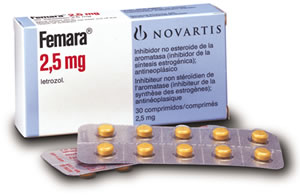Overview and History of Letrozole
Letrozole (Femara) belongs to a category and class of drugs known as aromatase inhibitors (AIs). Aromatase inhibitors belong to an even broader class of drugs known as anti–estrogens. The other subcategory of drug under the anti-estrogens category is known as selective estrogen receptor modulators (SERMs), such as Nolvadex and Clomid. AIs and SERMs make up anti-estrogens. Aromatase inhibitors differ greatly from SERMs in their action and how they deal with the issues of estrogen control. The misunderstanding that SERMs, such as Nolvadex and Clomid, serve to lower estrogen levels must first be addressed before delving into any further details.
This is a persistent rumor among the anabolic steroid using community that has begun to erode as of late, but the rumor still persists. SERMs serve to block the action of Estrogen at the receptor sites in breast tissue by occupying the receptor sites in place of Estrogen so that Estrogen itself cannot exert its effects there through receptor site binding. Conversely, SERMs will also act as Estrogens at receptor sites at other cells in other areas of the body (the liver, for example in Nolvadex’s case). SERMs do not lower circulating levels of Estrogen in blood plasma. Aromatase inhibitors serve to do this by eliminating the production of Estrogen through binding to and disabling the aromatase enzyme, which is the enzyme responsible for the conversion (or aromatization) of androgens into Estrogen.
Letrozole is a non-steroidal and non-suicidal aromatase inhibitor, and belongs to the third generation line of aromatase inhibitors. Letrozole is very identical to Arimidex and is one of the three major aromatase inhibitors available (Arimidex, Aromasin, and Letrozole). The difference between Letrozole and the other two major aromatase inhibitors is the fact that although it is utilized for the treatment of post-menopausal female breast cancer patients, it is actually specifically utilized for what is known as Estrogen receptor unknown breast cancer. This is a breast cancer condition in which the diagnosis indicates that it is unknown as to whether or not Estrogen is the culprit, or whether or not the breast cancer is aggravated by Estrogen. As with all other aromatase inhibitors, Letrozole is normally utilized after first-line treatments (such as Nolvadex) has failed, but various conditions may require Letrozole to be used as a first-line treatment, though this is rare.
Letrozole was developed after Arimidex but before Aromasin, and it is the strongest and most potent of the three aromatase inhibitors by far. Novartis had manufactured the drug after it was approved for sale on the American prescription drug market in 1997, and was sold as the brand name Femara as well as a separate brand name Femar in certain other select countries across the world (mostly in a few countries in Europe). As with other aromatase inhibitors, it has become extremely widespread and common not only in North America, but also in international regions, countries, and markets where it is believed to be that well over 70 countries carry Letrozole, with the brand name Femara being the most popular and most widely used. In addition to the primary brand names, Letrozole can also be found as countless other generic brands.
Letrozole (Femara) has caught on naturally with anabolic steroid using athletes, bodybuilders, and invidiuals, as is common with all aromatase inhibitors. This is because of the Estrogen controlling and reducing capability of Letrozole, which is favored in anabolic steroid users that are engaging in the use of aromatizable anabolic steroids (such as Testosterone, Dianabol, Equipoise, etc.) and that it can be effectively utilized to control issues resultant of excess Estrogen (bloating, blood pressure, gynecomastia, etc.).
Chemical Characteristics of Letrozole
Letrozole (Femara) is a non-steroidal aromatase inhibitor. This is to say that it does not possess the characteristic four ring cycloalkane ring carbon structure common of all types of steroids, unlike the steroidal aromatase inhibitor Aromasin (Exemestane).
Properties of Letrozole
Letrozole’s effects on serum Estrogen level control are perhaps the strongest and most effective of the three major aromatase inhibitors as noted in studies[1]. Even the informational pamphlets included with the pharmaceutical product have stated that at its standard tablet dose of 2.5mg is effective enough to reduce circulating Estrogen levels by an average of 78%. However, actual real clinical data has demonstrated far more effective reductions (remember that 78% is a determined average). Letrozole in studies has exhibited at least 98% reduction or more of serum Estrogen levels[2]. Letrozole can be so effective at inhibiting the aromatase enzyme and thereby reducing Estrogen levels that this compound is typically only administered to post-menopausal females, and/or utilized when other first-line treatments for breast cancer has failed. This is actually a common usage aspect of all three major aromatase inhibitors, as they are all very effective compounds for the purpose of Estrogen reduction, with Letrozole by far being the most effective.
Arimidex and Letrozole are both classified as non-steroidal and non-suicidal aromatase inhibitors that compete with the substrate for binding to the enzyme active site. This is very different from Aromasin (Exemestane), which is a steroidal and suicidal aromatase inhibitor that acts as a mechanism-based steroidal inhibitor that mimics the substrate, is converted by the enzyme to a reactive intermediate, and results in the inactivation of the aromatase enzyme[3]. For ease of understanding, what this means to the layman is that Aromasin’s chemical structure resembles the traditional ‘targets’ that aromatase binds to (Testosterone, for example) and that it essentially ‘fools’ the aromatase enzyme into binding with it, only to become inhibited/deactivated. Because the binding strength is so great, this inhibition becomes permanent for the aromatase enzyme that Aromasin has become bound to. Arimidex and Letrozole, being non-suicidal aromatase inhibitors, both compete with the enzyme’s traditional ‘targets’ rather than being assured a permanent spot (which is the advantage that Aromasin has over the other two).
Letrozole, as is common with all aromatase inhibitors has also demonstrated the ability to increase the endogenous production of LH (Luteinizing Hormone), FSH (Follicle Stimulating Hormone), and consequently, Testosterone levels in men, but this will be further covered in greater detail under the Letrozole doses section of the profile.
Bodybuilders and athletes utilizing anabolic steroids will usually favor aromatase inhibitors such as Letrozole for its ability to eliminate rising Estrogen levels at its root cause: aromatase. By disabling the aromatase enzyme, supraphysiological levels of aromatizable androgens (such as Testosterone, Dianabol, Deca-Durabolin, etc.) cannot convert into Estrogen, thereby eliminating any possible risk of Estrogen-related side effects.
Letrozole Side Effects
If you’re curious about the possible side effects of Letrozole, you’ll find this detailed guide helpful. Letrozole is part of a class of drugs called aromatase inhibitors. Its side effects are similar to those of another popular AI (Aromatase Inhibitor) known as Arimidex. Weakness and fatigue are the two main side effects that users of Letrozole experience most often. This drug is utilized in order to treat infertility. It’s also a popular choice with bodybuilders or others who are using anabolic steroids in order to gain muscle.
Letrozole has the capacity to reduce certain side effects which are linked with anabolic steroids. For example, men who want to avoid feminization side effects (such as gynecomastia) may find that this medication is effective. The medication suppresses the production of estrogen and this helps to keep feminization issues in steroid users at bay.
Anabolic steroid users who also utilize Letrozole tend to sidestep Letrozole side effects, provided the suppression of estrogen doesn’t go too far. There are exceptions, though. For example, a bodybuilder who is doing a hard prep cycle before a competition may be on a strict diet and be training in an intense manner. This type of bodybuilder might be more prone to side effects from Letrozole. Since strict diets and hard training also tend to cause fatigue and weakness, it’s sometimes difficult for bodybuilders to know if their side effects are being caused by Letrozole or their current lifestyles, or both.
Other possible side effects which are associated with this medication include hot flashes, headaches, depression, joint pain and headaches.
As well, this drug sometimes decreases the mineral content inside of bones. This may boost the risk of the Letrozole user developing osteoporosis. However, anabolic steroid users who also use Letrozole tend to be at lower risk, because many steroids boost the mineral content inside of bones. One anabolic steroid which does increase mineral content in bone is Nandrolone.
Some people react adversely to Letrozole, while others don’t. Everyone is different and everyone reacts to medications in an individual way. Keep this in mind as you decide whether or not to use Letrozole. If you try the drug and don’t react well to it, you should know that other medications which serve the same purpose are out there. An alternative medication might be more tolerable to your system.
The last side effect which is associated with Letrozole is cholesterol problems. In particular, a decrease in HDL cholesterol levels may be triggered by usage of the medication. When used on its own, this AI drug doesn’t seem to have a significant statistical impact. However, when used with anabolics, it may cause cholesterol problems. A lot of anabolic steroids have the capacity to impact cholesterol levels in a negative way. When used alongside anabolic steroids, the risk of cholesterol problems may be exacerbated.
Statistics from clinical studies demonstrate little negative impact when therapeutic doses of testosterone are administered. However, when testosterone and Letrozole are used together, the combination of medications have the capacity to suppress HDL cholesterol levels by up to a quarter. This is quite a jump in suppression and it’s something to be concerned with.
If testosterone is administered at a level which is “supra-physiological”, a level of suppression of HDL which is minimal may be anticipated. If the same dosage is utilized alongside an aromatase inhibitor, a twenty percent level of HDL suppression (or even higher) may happen.
Since there is the risk of negative side effects linked with cholesterol, particularly if anabolic steroids are also being used, it’s important for people who take Letrozole to lead lifestyles which promote healthy cholesterol levels. For example, choosing a diet which minimizes saturated fats and simple sugars will be beneficial. As well, adding more Omega fatty acids to a daily diet will be helpful. You may get these Omega-3 fatty acids through supplements or through your diet. A supplement may be a more convenient way to get what you need.
As well, some people who use Letrozole take cholesterol antioxidant supplements and find them beneficial. Also, build cardio exercise into your lifestyle if you plan to use Letrozole (or you’re already using it).
Since the cholesterol issues do present risk, some users of anabolic steroids prefer to try SERMs in order to keep estrogenic side effects at bay. While SERMs don’t always solve everything, they do work well for many people. If an aromatase inhibitor is required, a daily dosage of Nolvadex of about ten milligrams, taken alongside an AI, may be enough to keep cholesterol levels optimal. SERMs do promote normal cholesterol levels.
Letrozole Administration and Uses
Most women who are prescribed Letrozole in order to treat breast cancer take two and half milligrams per day. These doses are very potent and they are typically taken until breast cancer conditions go away. If a patient with breast cancer goes into remission, she’ll be switched to Nolvadex (from Letrozole) in order to prevent a recurrence of the same disease. The likelihood of weakness and fatigue at this dosage level is quite high.
Anabolic steroids users typically take lower doses, such as one half to one milligram of the drug per day. Men who are experiencing “man boobs” (gynecomastia) which are linked with usage of anabolic steroids sometimes take higher dosages, such as two and half milligrams per day. However, this higher dose does raise the risk of side effects.
This drug is available under the Femara brand. Femara markets it all over the world, in convenient tablet form. You’ll need a prescription in order to obtain it. It’s also accessible illegally through the black market. Research chemical labs may sell Letrozole, as may suppliers of anabolic steroids (underground labs). If you purchase this drug from a steroid dealer, in tablet format, you will definitely be breaking American law.
There are plenty of aromatase inhibitors available in the marketplace, the most popular and famous of which is Arimidex. That being said, a lot of people do prefer to use Letrozole. Sometimes, people experiment with both, at different times, in order to see what works best for them.
Letrozole Pictures:
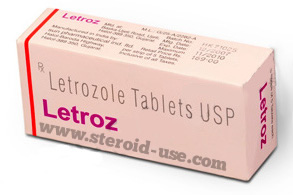
Letroz 2.5mg
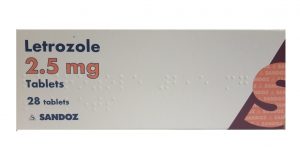
Letro 2.5mg SANDOZ
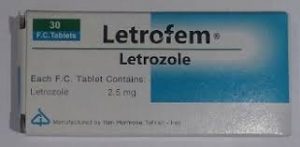
Letrofem 2.5mg
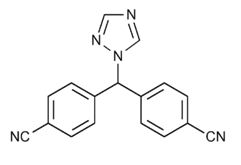 Letrozole (AKA Femara)
Letrozole (AKA Femara)
Chemical Name: 4,4′-((1H-1,2,4-triazol-1-yl)methylene)dibenzonitrile
Molecular Weight: 285.303 g/mol
Formula: C17H11N5
Original Manufacturer: Novartis
Half Life: 2 – 4 days
Detection Time: 2 weeks
Anabolic Rating: N/A
Androgenic Rating: N/A




